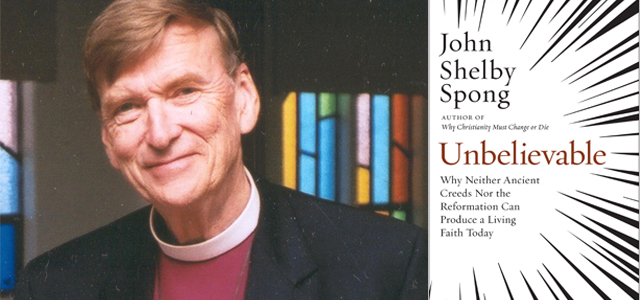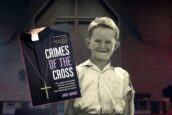
Spong and His 12 Theses

Review: Unbelievable – Why Neither Ancient Creeds Nor The Reformation Can Produce a Living Faith Today
Author: John Shelby Spong
This is Spong’s latest and last book. It is the third one of his I have read (the other 2 being Rescuing The Bible from Fundamentalism and his memoir, Here I Stand).
I should say at the outset that while I thought Spong was a clever de-constructionist in that he asked tough, necessary and probing questions of the Christian Faith and the Christian Church — and he explained why he thought many traditional beliefs and practices should be jettisoned — he didn’t do a satisfactory enough job in saying what the replacements should be.
In my view you shouldn’t remove the foundations of people’s long held beliefs and practices and not provide new foundations otherwise they are left with doubts and fears and I always felt that was rather cruel. In this book however, he makes a valiant attempt to provide reasons for our abandonment of these beliefs and practices and he provides what he considers the shape of a living, vital faith for the 21st century.
In the context of the 500th Anniversary of Luther’s Thesis nailing, Spong divides his book into 12 theses. Within each he gives several chapters detailing the current unsustaining traditional views and providing what he sees as the viable alternatives for today.
His 12 Theses are: God, Jesus Christ, Original Sin, The Virgin Birth, Miracles, Atonement Theology, Easter, The Ascension, Ethics, Prayer, Life After Death and Universalism. He concludes with the Epilogue entitled: My Mantra.
Time and space doesn’t permit a critique of each of his theses. So I will very briefly speak to his views on God as everything else flows from that. Spong acknowledges the problem of trying to describe God using just words which will always be inadequate but we have no other choice. He is very keen for us to realise that God is not a being or even a supreme being for a being occupies time and space and with God we are trying to describe something that exists beyond both, beyond even the human mind. He asserts that God is beyond a being but is “Being itself” (page 56). He is very keen to use theologian Paul Tillich’s phrase, the ground of all being”. He undertakes a study on the problem the Jewish people had in trying to even find a suitable word for “God” in the Hebrew Scriptures.
It is easy to imagine that this view of God has very far-reaching implications for everything that follows. Perhaps most significantly and controversially in his thesis on Atonement Theology Spong writes, “I begin this exploration with a statement that will offend some, amuse others and shatter a few, but that still needs to be said if we seek to move away from the almost unbelievable into a modern Christianity: Jesus did not die for your sins or mine! This distortion of Christianity, atonement as traditionally conceived, must be lifted out of the unconscious realm of our faith story, challenged and expelled” (pp158-9). I leave you to read His justification for this view.
Spong also says the ancient Creeds (Nicene and Apostles’) were summaries of the faith in the 4th Century CE and are of relevance only as historical statements and therefore should not be used as summaries or statements of the faith today.
Uniting Church people should have no issue with this as we have changed the Nicene Creed in order to appease the Orthodox Churches with whom we were (are?) having discussions on various matters. The Assembly agreed to remove the “Filioque Clause” from the Creed. It used to state, “…..the Spirit proceeded from the Father and the Son and with the Father and the Son is worshipped and glorified…” It was changed so now we say, “… the Spirit proceeds from the Father, who with the Father and the Son…” This was because of the particular view of the Trinity espoused by the Orthodox Churches. In Spong’s Christianity all this is meaningless, historical nonsense (my words). Much blood was spilled in the past over this very clause and while I think Spong is right in jettisoning it to history, when I am in a service where the Creed is recited I always used to add the Filioque Clause in under my breath. Now I just don’t say it all.
Like a good thriller, if you want to know “who done it” you can go the final chapter to find out. Spong, for the first time to my knowledge, gives us a clear statement of his views. This is where he summarises his thoughts and states his understanding of a sustainable Christian Faith. If you don’t want to read the entire 287 pages then I suggest you read his chapter on God and any other chapter that might attract your interest then read his final chapter, his mantra.
I am not sure I agree with all his conclusions but I believe this to be his best book because he doesn’t just tear down but he seeks to put something viable, even substantial in its place. This book is worth reading just for that.
Rev. Neil Ericksson





























































1 thought on “Spong and His 12 Theses”
Check Sheridens article in the The Australian on the Ascension